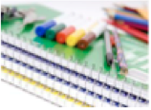|
When a struggling reader has been referred for a Special Education Evaluation in her school, she may receive a school psychological evaluation, special education testing, a speech-language evaluation, and hopefully other relevant assessments such as from an occupational therapist.
If the IEP Team – of which you (as a parent or teacher) are a key member – has determined that your child is eligible for Special Education services, the Team will identify your child with one of several possible labels: -Communication Impairment -Developmental Delay (especially if your child is 2nd grade or below) -Specific Learning Disability (SLD) The most important result of this IEP (Individualized Education Plan) is the instruction and support that your child will receive. Each child – who is identified with a ‘disability’ at an IEP Meeting – has a unique profile of strengths and weaknesses, and teaching approaches need to be tailored to address your child’s needs. If your younger child (or student) really struggles to sound out words, remember sight words, read sentences/stories, and spell, or if your older child reads very hesitantly and with great effort and/or makes a great number of errors; or if she struggles to understand text or to write, you may ask if she is Dyslexic. The IEP Team’s response is very important. You may hear a response that she is Dyslexic or has a specific reading disability. However, you may hear some responses similar to these: -We don’t label our students because that is not fair to them. -Dyslexia is a medical diagnosis, so we can’t say that. -A young child can’t be diagnosed with Dyslexia; we can test for that in a couple of years. -We will put these supports into place first before we say that. There may be many reasons that the IEP Team may give those last 4 responses, but you should be concerned that the services that the Team recommends may not fully address your child’s needs. You have some options if you are concerned. Please refer to the Parent's Guide To Special Education (which is in our Blog on 1/22/2017) for initial support. Also, a great deal of special education regulations are based on the Individuals with Disabilities Act (IDEA); you should look to learn about this federal law (http://idea.ed.gov). If you have any questions about this process, please feel free to contact Linguistic Foundations; we can help clarify some of your questions. We can also talk about testing support that Linguistic Foundations offers. Thanks very much. As a Parent or Teacher, you understand that Language plays a role in a child’s Reading, Writing, and overall Academic development and performance. In your interactions with your child or student, you naturally use language as the means to communicate and also to teach. It is the Natural way, and we often don’t even think about how we use language to help a child grow and learn!
But when a child is struggling with her language understanding or expression – or when she is not reading, writing or understanding effectively – language becomes a much more important component. This is when a Parent and Teacher need to have more specific knowledge about Language. I can think of two Questions to ask How can I improve my Communication with my Child to make learning experiences more productive? How do my Child’s Language Skills impact her development and growth of Reading, Writing, and other Academic Areas? You can find a great deal of practical and user-friendly information at www.asha.org. This website is the home of the American Speech-language and Hearing Association (ASHA), which is the national organization of speech-language pathologists. I find these links incredibly helpful! *Reading, Writing, & Language-Based Learning Disabilities (including Dyslexia) http://www.asha.org/topics/literacy/ http://www.asha.org/public/speech/disorders/LBLD/ *I think these links are particularly helpful. A child who is struggling with Literacy may well have subtle Language-related weaknesses that have not been noticed. Typical Language development http://www.asha.org/public/speech/development/ Language disabilities in the schools http://www.asha.org/public/speech/development/schoolsFAQ/ Please feel free to contact Linguistic Foundations with any questions you may have related to Language-based learning for a child, adolescent, teen, or adult. We will be happy to speak with you – it is our passion and an important key to a child’s learning! In addition, if you think your child can benefit from assessment of her Language-learning and Literacy skills, we can speak about that, as well. Thank you very much! |
The Latestfrom Archives
May 2018
Categories
|



 RSS Feed
RSS Feed
